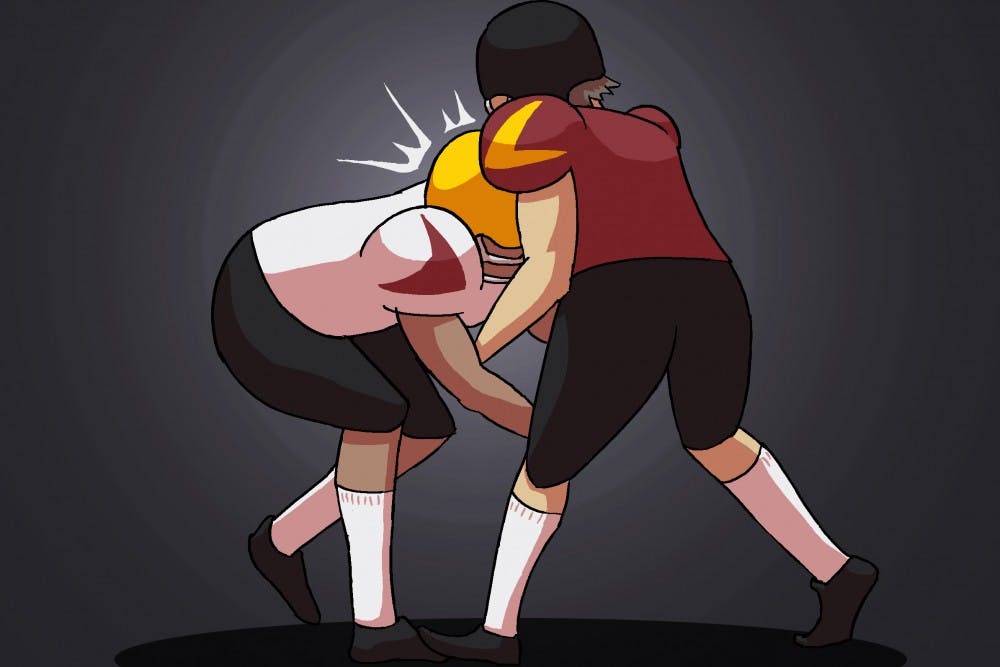When I was growing up, kids played sports. Baseball, basketball, whatever: if you wanted it, there was a league for it. Football was no different.
Sprain an ankle? Tape it up, take a week off, then get back on the field when it’s healed. Jam your finger? Pop it into place, get back out there at the next down.
Nobody thought about hidden injuries. Concussions are not easily detected by a cursory look-over or stretch session. And wether or not they were visible, we just weren't watching for them.
Now, more often than ever, you will hear "football" and "concussion" in the same sentence. In the summer of 2012, Junior Seau, a linebacker who played for several teams including the San Diego Chargers and New England Patriots, shot himself in the chest. He later died, and inspection of his brain revealed that he was suffering from chronic traumatic encephalopathy, a degenerative brain disease that is now linked with repeated head trauma.
CTE, like Alzheimer’s, is a degenerative disease. Your brain eventually starts to fade away, but that’s after you begin suffering from dementia, dizziness and confusion.
Since the death of Seau, many former football, hockey, rugby and other contact sports players have come forward reporting the presence symptoms linked to CTE. In the face of highly concerned America, The National Football League admitted in 2013 that they too believe that there is a link between concussions and CTE.
Even with extensive research, the NFL notes that it is hard to pinpoint a concussion exactly when it happens, and they suspect that many players under-report their head injuries.
Dr. Steven R. Corman, director of the Center for Strategic Communication at ASU, is the primary investigator of a study funded by the NCAA Mind Matters Research Challenge. Some money from the NCAA grant goes towards medical studies, but Corman is studying the social aspects of concussion reporting.
“Our grant is in the social science component, so basically we're interested in attitudes and behaviors and the links between those in terms of concussions and concussion reporting,” said Corman.
According to Corman, concussion reporting is a tricky thing to get data on because they are often unreported to medical or coaching staff.
There are different reasons that problem could exist, says Corman, and he and other researchers are looking at three different levels of reporting:
- Individual: Focuses on what would motivate an individual to not report a concussion.
- Team Culture: Focuses on what factors within the team would convince a player to not report a concussion, like feeling that the team needs you on the field.
- Cultural Narratives: “Things like making it to the big leagues, being a masculine warrior,” are both influences that could prevent a player from reporting a concussion, said Corman.
Honestly, the inclination to "just keep trucking" through an injury is something I can empathize with. While I never played competitive football, I did serve in the Marine Corps, and the military operates the same sort of way. In the Marines, you never really report an injury when it happens. You’re told to report it, absolutely, but you don’t want to do that: only weak people do that.
It’s a warrior mentality. You want to fight through pain and not show weakness, even if that pain is a sign of a much larger problem and could be putting your overall health at risk. That same mentality can be applied to mental health, too.
You’re taught to be a tough individual, to be independent and not need help. When your health is in question, being the "tough guy" is not only counter-productive, but can also be fatal. This attitude keeps many veterans from seeking counseling, and we lose veterans every day to suicide. Now, it appears the same "don't ask, don't tell" mantra is costing athletes their minds as well.
In Corman’s study, the NCAA is attempting to look at what can be done to battle CTE and head trauma, from the field all the way to the locker room.
The collegiate research alone is great start, but many players may be coming out of high school with several concussions already. In the US, even a five-year-old can slap on some pads and play competitive football.
The recent buzz surrounding concussions has had an impact on the amount of youth playing tackle football. Even several former NFL players like Terry Bradshaw say they will not let their sons play football. As of now, I don’t have any kids. But when I do, I’m not sure if I'm going to let them play football. They definitely won't be playing at 5 years old, and maybe not even in their teens.
It’s a position I’m sure many sports fans are in; we love football, but it is a violent and brutal sport. At what point do we say “enough is enough," and start using our dollars to evoke change? Rules like no-kickoffs and changing the overall sports culture could do wonders for improving player safety from Pee-Wee football all the way to the NFL.
Hopefully America can make up its mind soon, so football players can stop losing theirs.
Reach the columnist at cjwood3@asu.edu or follow @chriswood_311 on Twitter.
Editor’s note: The opinions presented in this column are the author’s and do not imply any endorsement from The State Press or its editors.
Want to join the conversation? Send an email to opiniondesk.statepress@gmail.com. Keep letters under 300 words and be sure to include your university affiliation. Anonymity will not be granted.
Like The State Press on Facebook and follow @statepress on Twitter.




